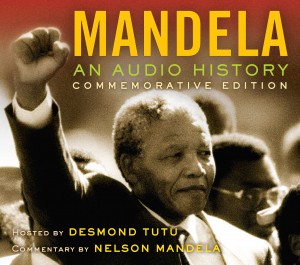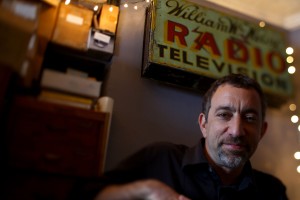 The life of Nelson Mandela – a life that faced oppression, sparked revolution, survived prison, rebuilt a nation, and transformed the world’s view of justice, continues to inspire. Upon his death in December of 2013, at age 95, the world celebrated his unwavering dedication to “the idea of a democratic and free society in which all persons will live together in harmony with equal opportunities.” HighBridge continues this celebration with an updated and expanded edition of the award-winning production from Radio Diaries, Mandela: An Audio History. The ideals for which Mandela was “prepared to die” at the time of his trial in 1964 are given full voice through interviews with Mandela himself, Desmond Tutu, fellow political prisoners Ahmed Kathrada, Eddie Daniels, Sonny Venkatrathnam, political opponents P.W. Botha and F.W. De Klerk, and a host of others that offer a level of observation that only living witnesses to history can provide.
The life of Nelson Mandela – a life that faced oppression, sparked revolution, survived prison, rebuilt a nation, and transformed the world’s view of justice, continues to inspire. Upon his death in December of 2013, at age 95, the world celebrated his unwavering dedication to “the idea of a democratic and free society in which all persons will live together in harmony with equal opportunities.” HighBridge continues this celebration with an updated and expanded edition of the award-winning production from Radio Diaries, Mandela: An Audio History. The ideals for which Mandela was “prepared to die” at the time of his trial in 1964 are given full voice through interviews with Mandela himself, Desmond Tutu, fellow political prisoners Ahmed Kathrada, Eddie Daniels, Sonny Venkatrathnam, political opponents P.W. Botha and F.W. De Klerk, and a host of others that offer a level of observation that only living witnesses to history can provide.
Producer (and Radio Diaries founder) Joe Richman spent extensive time in South Africa in 2003, researching an epic, multi-faceted story that was as personal for many of its participants as it was of historical importance to the world at large. Richman, along with co-producer Sue Jaye Johnson, miraculously turned fifty hours of archival recordings, plus contemporary interviews with more than fifty participants from the anti-Apartheid movement, into an impressively concise, moving, and ultimately rewarding hour of listening. The mosaic of perspectives presented here captures a South Africa still reckoning with the lessons of reconciliation and reeling from recent wounds. And yet it is clear from the hard-earned wisdom in these accounts that some healing for that nation has already begun as the participants each share their piece of a collective history – one as turbulent and thrilling as any adventure novel.

Many of the voices offer details that would normally be lost in a typical history. We hear vivid recollections of historic moments with the level of detail that throws a spotlight on the humanity – and inhumanity – of unforgettable events: Protest organizer Bongi Mkhabela’s flashback to the children “with shining black shoes and little white socks” that marched peacefully – and joyfully – in protest of the imposition of Afrikaans as a national language, only to face deadly violence. Co-defendant Denis Goldberg’s recollection of his unexpected reaction when handed life sentences by the government: “We turned to each other and laughed because we expected to be hanged.” P.W. Botha’s incredulity and unexpected sense of admiration for Mandela, who startled him by showing up with at the government negotiating table offering reconciliation after 28 years in prison: “He didn’t come up with a statement of bitterness, retribution. There’s no way you can argue against that.”
In addition to the array of first person testimonials, Richman makes use of archival materials that provide multiple “Wow! How did he find this stuff!” moments. While superficially as quaint as most government propaganda, the abundance of newsreel footage throughout the program accurately – and eerily – tracks South Africa from the 1940s through the 1980s as a society that would be hard for modern sensibilities to comprehend otherwise: A thoroughly segregated state, denying basic rights – both human and political – to the majority of its people. Then, when faced with its untenable fate, resisting change at every turn.
Even more powerful are recordings of pivotal moments that were thought to be lost. As Richman shares in his introduction, unlabeled tapes discovered in the basement of the South African Broadcasting Corporation turned out to contain original recordings of Mandela’s now-famous “I am prepared to die” speech. The sounds of the courtroom, the tension in government voices, and the voice of Mandela, adamant in its conviction that the government should be on trial instead, are the sounds of history resurrected. Equally dramatic is the clearly audible shock in the reaction of a disbelieving parliament 27 years later when President F.W. De Klerk makes the surprise announcement that “the government has taken a firm decision to release Mr. Mandela unconditionally … the time for negotiation has arrived.”
Some audio experiences educate and inform. Only the best effectively transport you to another time and place while doing so. Rarely do they convey the emotional impact of a complete, regime-shaking, freedom-seeking, and ultimately triumphant social history featuring some the most inspiring civil rights heroes the world has known – all on a single CD. For pure storytelling power, archival exactitude, and a multi-dimensional combination of perspectives from those who were there, Mandela: An Audio History achieves the highest level of art and authenticity an oral history can possess. Mandela’s voice could not be silenced during his lifetime, and thanks to Radio Diaries, the collective voice of Mandela and his generation will live on in the form of this excellent audio documentary. For those who care about the depth of human experience, and the power of the human voice to transform lives, this is essential listening.

No Comments so far ↓
There are no comments yet...Kick things off by filling out the form below.